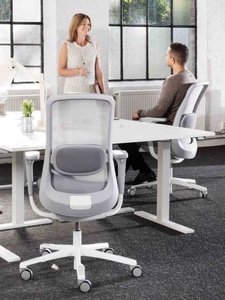A DSE Assessment evaluates how employees use Display Screen Equipment like computers and laptops to ensure comfort, safety, and compliance. In Ireland, DSE Assessments help prevent strain, improve productivity, and meet health and safety regulations for office, hybrid, and remote workers.
DSE assessments Ireland - Introduction
Most employees spend long hours in front of screens — whether working at the office, from home, or on the go. This constant use of technology has made Display Screen Equipment (DSE) safety and compliance more important than ever.
A DSE assessment ensures that your workstation is set up correctly to support both your health and productivity. Beyond being good practice, DSE assessments are a legal requirement under Health and Safety Regulations in many countries, including Ireland.
Conducting regular, high-quality DSE Assessments in Ireland helps organisations meet compliance obligations, protect employee wellbeing, and reduce the risk of discomfort or injury caused by poor workstation setups.
What Does DSE Mean?
DSE stands for Display Screen Equipment — this includes any device with a display, such as desktop computers, laptops, tablets, and even mobile phones.

Employees who use these screens for extended periods as part of their daily tasks are known as DSE users. Without the right setup, these individuals may experience musculoskeletal discomfort, eye strain, repetitive strain injuries (RSIs), and fatigue.
A 2024 study of UK and Ireland device users found that 94.3% reported musculoskeletal symptoms and 89.5% reported eye strain among those working from home for long screen hours.
DSE requirements apply not only to traditional office setups but also to remote and hybrid workers. Anyone who regularly uses display screens should have a proper DSE assessment to ensure safe and sustainable working habits.
What is a DSE Assessment?
A DSE assessment is a structured evaluation of how an employee interacts with their workstation. It reviews posture, equipment layout, and environmental conditions to ensure safe, ergonomic working practices.
During a DSE assessment, the assessor will check factors such as chair adjustability, desk height, monitor position, keyboard and mouse placement, and lighting. The aim is to identify potential risks — such as awkward postures or repetitive strain — and make practical recommendations to enhance comfort and reduce injury risk.
The value of these assessments is underscored by data showing that in Britain, an estimated 543,000 workers suffered work-related musculoskeletal disorders (MSDs) in 2023-24, resulting in 7.8 million working days lost.
Why Are DSE Assessments in Ireland Important?
1. Health Benefits
Regular DSE Assessments in Ireland help prevent common issues such as neck, shoulder, and back pain, repetitive strain injuries, and eye fatigue. Across Europe, about 24.7% of workers report backacheand 22.8% report muscular pains (shoulders/neck/upper-lower limbs).
2. Legal Compliance
Under the Safety, Health and Welfare at Work (General Application) Regulations 2007, Irish employers must protect employees who use display screen equipment. Conducting DSE Assessments in Ireland ensures organisations meet these obligations and demonstrate a commitment to employee safety.
3. Productivity and Wellbeing
A comfortable and ergonomic workstation improves focus, reduces fatigue, and supports overall performance. Employees who feel physically supported are more likely to be engaged and productive.
4. Hybrid and Remote Working
As hybrid and home working become more common, employers must ensure that remote setups meet the same ergonomic standards as office spaces. A report by the British Safety Councilfound over 470,000 workers experienced MSD symptoms linked to hybrid or remote work setups.
Notably in Ireland and highlighted in one of our previous articles, 67% of organisations remain at risk of DSE non-compliance— largely due to the shift to remote and hybrid working.

What Happens During a DSE Assessment?
A typical DSE assessment involves:
1. Initial discussion or questionnaire – Understanding the employee’s work patterns, daily tasks, and any areas of discomfort.
2. Workstation review – Checking desk layout, screen height, chair support, and posture.
3. On-the-spot adjustments – Making quick improvements (e.g., adjusting chair height or monitor distance).
4. Recommendations – Suggesting ergonomic accessories or behaviour changes such as regular movement breaks.
5. Report and follow-up – Providing a written summary with recommendations and next steps for the employee and employer.
Given that nearly 94% of DSE users report musculoskeletal discomfort, these steps are vital for preventing workplace-related strain. (PubMed Study)
Common Issues Identified During DSE Assessments
Frequent issues uncovered during DSE Assessments Ireland include:
Monitors set too high, too low, or too far away.
Chairs lacking lumbar or lower-back support.
Keyboards and mice placed too far forward, causing over-reaching.
Poor lighting or screen glare.
Extended sitting without sufficient movement breaks.
Addressing these problems can dramatically improve comfort and reduce the risk of long-term musculoskeletal strain. Poor workstation design has been shown to cause upper-limb disorders, headaches, and visual fatigue according to HSA guidance.
How Often Should DSE Assessments Be Done in Ireland?
Employers should conduct a DSE assessment:
When a new employee starts.
When a workstation or equipment changes.
When an employee reports discomfort or pain.
Regularly — typically once a year or following major role changes.
For hybrid and remote teams, virtual DSE Assessments Ireland provide an efficient, compliant solution for reaching all staff.
According to the UK Health and Safety Executive (HSE), an assessment is required if workers use DSE daily for continuous periods of an hour or more.
How to Prepare for a DSE Assessment in Ireland
To get the best results from your assessment:
Note any pain, discomfort, or regular posture issues.
Take photos of your current workstation (especially if remote).
Be prepared to discuss your daily screen time and work patterns.
Mention any space or equipment limitations that may impact setup.
Tips for Maintaining Good DSE Habits
Keeping healthy ergonomic habits between assessments is essential:
Take regular breaks: Stand, stretch, and move every 30–45 minutes.
Adjust your chair correctly: Feet flat on the floor, back supported, shoulders relaxed.
Position your monitor properly: Top of the screen at eye level, about an arm’s length away.
Use ergonomic accessories: Such as a laptop stand, external keyboard, and mouse.
Control lighting and glare: Use blinds or adjust brightness for comfort.

Conclusion of DSE assessments Ireland
A DSE assessment is far more than a compliance exercise — it’s an investment in your employees’ long-term health, comfort, and performance. By identifying risks early and making simple adjustments, staff can work more efficiently and avoid preventable discomfort.
If your organisation hasn’t recently reviewed its workstation setups, now is the perfect time. Investing in DSE Assessments in Ireland shows that you value employee wellbeing while meeting all Irish health and safety obligations.
A few small adjustments today can make a lasting difference to comfort, health, and productivity tomorrow.
Take the next step toward a safer, more comfortable workplace.
Book a DSE Assessment with KOS today and ensure your organisation stays compliant, productive, and wellbeing-focused.
Remote Ergonomic DSE Assessments
Available as single, half-day, or full-day sessions. Flexible, compliant, and designed to support employee wellbeing—wherever they work.
In-Person Ergonomic DSE Assessments
Single, half-day, and full-day onsite DSE Ergonomic assessments available. Tailored in-person support to meet your compliance and employee wellbeing needs.
Detailed Ergonomic
Assessments
For pregnancy, medical, and on-demand needs. Personalised evaluations to support health, comfort, and compliance.
Frequently Asked Questions about DSE Assessments Ireland
If your team regularly works with computers, laptops, or other Display Screen Equipment, it’s essential to understand your responsibilities under Irish health and safety laws. This FAQ section covers the most common questions about DSE Assessments Ireland — from who needs one and how they’re carried out, to how often they should be reviewed. Whether your employees are office-based, remote, or hybrid, proper DSE assessments help ensure compliance, comfort, and long-term wellbeing.
Any employee who regularly uses Display Screen Equipment (DSE) — such as computers, laptops, or tablets — for an hour or more each day should have a DSE Assessment. This includes office, hybrid, and remote workers. Regular DSE Assessments Ireland help ensure compliance with Irish health and safety regulations and promote long-term employee wellbeing.
A typical DSE Assessment takes between 20 and 45 minutes per person, depending on the workstation setup and individual needs. During the assessment, the assessor reviews posture, screen position, chair adjustment, and other Display Screen Equipment factors to identify improvements for comfort and compliance.
Yes. Many organisations now choose virtual DSE Assessments Ireland, which can be completed via video call or photo review. This flexible option is ideal for hybrid and home-based teams, ensuring that every employee using Display Screen Equipment meets ergonomic and legal requirements, regardless of location.
Failure to carry out DSE Assessments in Ireland can lead to non-compliance with health and safety regulations, potential enforcement action, or fines. More importantly, neglecting Display Screen Equipment safety can result in increased employee discomfort, musculoskeletal issues, and productivity loss — with over 7.8 million working days lost annually due to related disorders.
It’s recommended that DSE Assessments Ireland be reviewed at least once a year or whenever an employee’s workstation, equipment, or working environment changes. Regular reviews ensure ongoing compliance with Irish safety standards and continued protection for employees who use Display Screen Equipment daily.
KOS Ergonomics is a trusted provider of remote DSE assessments in Ireland, with over 100,000 workplaces assessed. Our assessors are clinically trained in ergonomics, anatomy, and physiology. We deliver detailed reports with practical, prioritised advice, helping you improve employee comfort and meet health and safety requirements.















